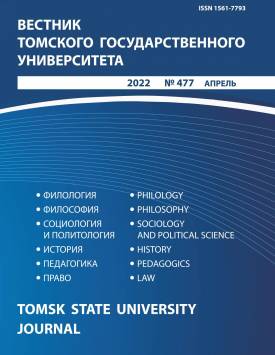New Realism: Ideas and limits
This article is an attempt at a rough cartography of the concepts of philosophical realism that are not part of the corpus of ideas of speculative realism. The author reconstructs the ideas of four realist philosophers, Jocelyn Benoist, Lynn Baker, Maurizio Ferraris, and Marcus Gabriel; highlights the key points of one or another concept; outlines the intellectual origins of the emergence of the philosophical approach; and proves that the philosophers in question represent a philosophical current. The author tries to solve the problem of disunity that exists within this current of philosophical thought. The disunity lies in the fact that the works of Benoist and Gabriel, or Baker and Ferraris are seen as independent and not bound by the same program intention. Moreover, sometimes leading non-mainstream (new) realists themselves cannot understand who can be assigned to their camp (the example of Benoist, who did not participate in any conference of new realists and did not publish his articles in any collection of new realists, is remarkable). In addition, there is a bias within the Russian philosophical community that elevates speculative realists to a cult and leaves new (non-mainstream) realists off the topical agenda. The solution to this disunity is proposed through a theoretical reconstruction of the approaches of the previously mentioned authors (Benoist, Gabriel, Baker, and Ferraris), which explicates the origins of the philosophical concept (the corpus of authors and texts on which the realist approach is based), the basic theses, the categorical apparatus and the relationship of concepts within the approach. The use of the above method of reconstruction makes it possible to prove the thesis that the realist philosophers considered in the text of the article, who do not work within the speculative approach, can be united into the current of New (Non-Mainstream) Realism. The conclusions obtained by using the method of reconstruction of philosophical ideas show that all the projects discussed in the article develop as a critical response to some established language of philosophy - phenomenology (as in the case of Benoist and his contextual realism), constructivism and cor-relationalism (as in the case of the new transcendental realism of. Ferraris), anti-realism (as in the case of the neutral realism of Gabriel), naturalism and physicalism (as in the case of the practical realism of Baker). The author also notes that within the New (Non-Mainstream) Realism two directions of theorizing can be distinguished - artifactual (Ferraris and Baker) and contextual (Gabriel and Benoist). In addition, this article can be seen as a compendium of the key ideas of Non-Mainstream (New) Realism, which allows to some extent a stronger popularization within the Russian philosophical community of the ideas of New Realism and inspiration for research in this field.
Keywords
realism, Jocelyn Benoist, Lynn Baker, Maurizio Ferraris, Marcus GabrielAuthors
| Name | Organization | |
| Popov Evgeniy V. | National Research University Higher School of Economics | evgeniipalamodov@mail.ru |
References

New Realism: Ideas and limits | Vestnik Tomskogo gosudarstvennogo universiteta – Tomsk State University Journal. 2022. № 477. DOI: 10.17223/15617793/477/7
